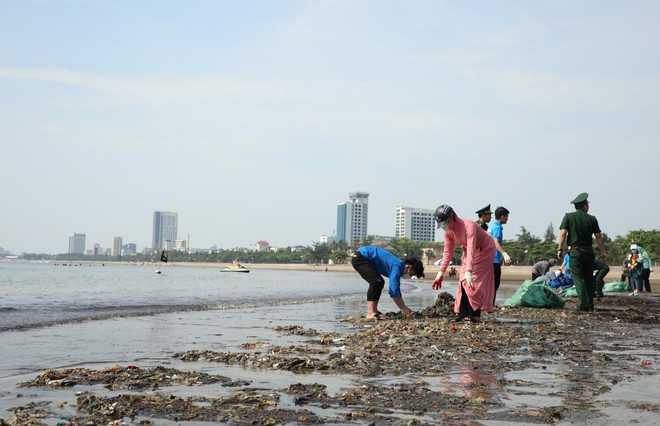Hanoi (VNA) – Cities and provinces need to build local-level models on plastic waste management to improve the green living environment, reduce impact on the economy and tourism, and make an important contribution to future generations.
Deputy Chairman of the National Assembly's Science, Technology and Environment Committee Ta Dinh Thi made the statement at the conference on models, solutions for household solid waste management and plastic waste reduction. The event was chaired by the Vietnam Administration of Seas and Islands under the Ministry of Natural Resources and Environment, in collaboration with the World Wide Fund for Nature (WWF) Vietnam on November 4 in Hanoi.
Thi called on all 63 cities and provinces nationwide to take action and encouraged them to consult and pilot models and solutions for household solid waste management and plastic waste reduction in localities.
According to Nguyen Duc Toan, Director of the Vietnam Administration of Seas and Islands, plastic pollution and ocean waste a globally urgent issue, threatening ecosystems, the environment and people’s life quality. Therefore, it is important to have strong solutions to solve the extensive ocean plastic pollution problem in Vietnam.
In implementing Resolution No. 36-NQ/TW on the "Strategy for Sustainable Development of Vietnam's Marine Economy," the Government and state management agencies at central and local levels have coordinated with domestic and foreign organisations to cut plastic waste. The goal is to deploy many solutions through projects and specific action programmes. Projects have been approved and implemented from 2020 in 10 areas of nine provinces and cities. The plastic-reducing cities in Vietnam programme carried out since 2018 fits under the Plastic Smart Cities (PSC) initiative - a global initiative of WWF.
According to Toan, the project contributed to the implementation of the law on sea and island natural resources and environment, and the 2020 environmental protection law. It also serves the national action plan on reducing ocean plastic waste and the project on Vietnam’s preparation and participation in building a "Global Agreement on Ocean Plastic Pollution."
On that basis, delegates at the conference discussed contributions and experiences of localities in managing household solid waste and plastic waste. The core role of urban areas is an effective solution, and centrally positioned to mobilise plastic pollution reduction in Vietnam.
Prasanna De Silva - Executive Director of WWF International, said that although there are still many difficulties and challenges in implementing the urban plastic reduction programme in Vietnam, efforts of localities have brought encouraging results. They have been effective in the management, collection and classification of household solid waste, and reduction of plastic waste.
The results of the project will contribute to helping Vietnam realise its goal toward no plastic waste in nature by 2030, said De Silva.
The project on reducing ocean plastic waste in Vietnam is funded by German Ministry of Environment, Nature Conservation and Nuclear Safety through WWF - Vietnam.
The project’s goal is to contribute to reducing ocean plastic waste pollution in Vietnam through the development of technical guiding documents to support the implementation of solid waste management policies./.






























